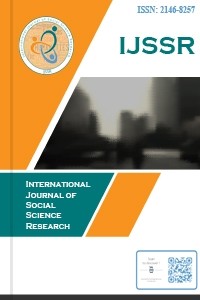Döviz Kuru İle Tüketici Güveni İlişkisi: Türkiye Örneği
Tüketici Güveni, Döviz Kuru, Türkiye, Zaman Serisi Analizi
___
- Çelik, S. (2010). An Unconventional Analysis of Consumer Confidence Index for the Turkish Economy. International Journal of Economics and Finance Studies, 2: (1), 121-129.
- Delorme, Jr., C. D., Kamerschen D. R. and Voeks L. F. (2001). Consumer Confidence and Rational Expectations in the United States Compared with the United Kingdom. Applied Economics 33: (7), 863-869.
- Gürgür, T. and Kılınç, Z. (2015). In Search of the Drivers of the Turkish Consumer Confidence. CBRT Working Paper, 15: (38), Ankara.
- Golinelli, R. and Parigi, G. (2004). Consumer Sentiment and Economic Activity: A Cross Country Comparison. Journal of Business Cycle Measurement and Analysis, 1: (2), 147-170.
- Karasoy, H. G. (2015). Consumer Confidence Indices and Financial Volatility. Research Notes in Economics, Central Bank of the Republic of Turkey, 15: (16).
- Narayan S., and Narayan P.K. (2004). Determinants of Demand of Fiji’s Exports: An Empirical Investigation. The Developing Economics, 17: (1), 95-112.
- Katona, G. (1968). Consumer Behavior: Theory and Findings on Expectations and Aspirations. The American Economic Review, 58: (2), 19-30.
- Ludvigson, S. (2004). Consumer Confidence and Confidence Spending. Journal of Economic Perspectives, 18: (2), 29-50.
- McIntyre, K. H. (2007). Reconciling Consumer Confidence and Permanent Income Consumption. Eastern Economic Journal 33: (2), 257-275.
- Oral, E. (2005). Consumer Confidence Index for Turkey. OECD Workshop on International Development of Business and Consumer Tendency Surveys, Brussels, Belgium.
- Pesaran, M. H., Shin, Y. and Smith, R. J. (2001). Bounds Testing Approaches to the Analysis of Level Relationships. Journal of Applied Econometrics, 16: (3), 289-326
- Yayın Aralığı: Yılda 2 Sayı
- Başlangıç: 2012
- Yayıncı: Şahin ORUÇ
Basın Kaynaklarına Göre 27 Mayıs 1960’a Giden Süreçte Turan Emeksiz Olayı
Türk Eğitim Sisteminde Fırsat ve İmkân Eşitliğine İlişkin Öğretmen Görüşleri
Hakan POLAT, Mukadder BOYDAK ÖZAN
The Determination of Environmental Literacy Levels of Elementary Teacher Candidates
Döviz Kuru İle Tüketici Güveni İlişkisi: Türkiye Örneği
Spor Yöneticiliği Bölümünde Okuyan Üniversite Öğrencilerinin Öz-Farkındalık Düzeyleri
Mustafa Enes IŞIKGÖZ, Selhan ÖZBEY, Pınar GÜZEL, Melike ESENTAŞ
